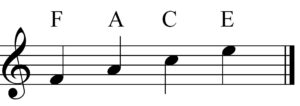3 Tips To Make Reading Piano Music Easy
FACE- Learning The Line and Space Notes of the Treble Clef

Learning to read music is just one part of learning to play the piano but it’s a big part. Confidence in knowing music note names can help students in their piano lessons by freeing them to express the music they are trying to learn rather then focus on the names of the notes.
Piano Teachers, and all music teachers are familiar with acronyms to make the process of learning note names easy in piano lessons. Knowing these will no doubt relieve the stress of naming notes and therefore make learning piano easier. Read on to make reading music easier.
Treble Clef And The Staff
First the basics – the musical staff is made up of 5 lines and 4 spaces between the lines. We use these lines and spaces to write notes and each position on the staff has a different note on it. When the notes exceed the lines and spaces of the staff in either direction, those notes sit on small lines called ledger lines and the spaces between them.
A Treble Clef symbol (see picture) at the beginning of the staff tells us that we’ll be playing a specific group of notes and it’s this group of notes that I’d like to share two very popular acronyms for.
FACE – It’s Not Part Of Your Head
The acronym most piano students use to learn and remember the spaces on the treble clef, is FACE. The bottom space note is F. The space above that is A, then C, and finally E. By knowing this series of notes in an easy way, students can identify the note they need to play on the piano easily. But what those notes on the line? Fear not.
Every Good Boy Does Fine

This one you may remember from grammar school. The acronym many students use for the lines of the treble clef is EGBDF- Every Good Boy Does Fine. The bottom line is E, then G, B, D, & F. This acronym, along with FACE gives you all the names of every note on each line and space note. These tips alone won’t teach you how to read piano music but it can make the whole process easier, especially for beginning piano students.
The Mighty “G” Clef – Reading Piano Music

Last tip here, another name for treble clef is ‘G clef’ because the curl of the clef surrounds the G line of the staff. If you forget everything else, at least remember this. If you know where the G is, you can figure out the rest easily!
Be Creative
A fun activity for students and teachers is to let them create their own acronym! If they make their own it’s even more memorable to them. Mine is Every Green Bird Does Flips. What is yours?
